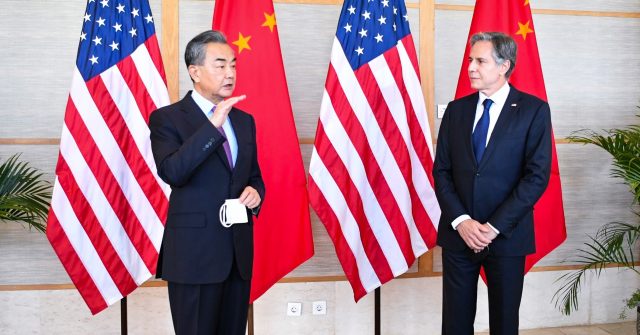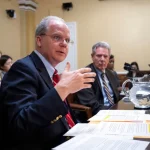

Chinese Foreign Minister Wang Yi presented his American counterpart, Secretary of State Antony Blinken, with four separate lists of Communist Party demands during a meeting this weekend, which included an “updated list of U.S. wrongdoings that must stop.”
The meeting took place on Saturday in Bali, Indonesia, where both top diplomats had stopped on simultaneous Asia tours meant to shore up influence for their respective countries in the region. The Chinese government propaganda outlet Global Times reported that Wang and Blinken engaged in a contentious five-hour dialogue in which Wang lectured Blinken on topics such as lifting Trump-era tariffs on the Communist Party and ceasing the partial support America lends to the democratic nation of Taiwan. The state newspaper called the five-hour conversation session “efficient” and praised Wang for his “sternest” confrontation of Blinken yet.
Blinken has made a habit of marathon meetings with Wang, senior Politburo member Yang Jiechi, and other top communists since President Joe Biden took office in early 2021. The inaugural session, which also featured Yang and American National Security Adviser Jake Sullivan, featured a public element in which Yang ranted for 16 minutes about “Black Lives Matter” and racism in America with little pushback from the American counterparts – despite China currently engaging in multiple acts of genocide and being embroiled in a growing number of racist scandals such as the implementation of “apartheid” work sites in Africa and Chinese nationals tricking African children into making racist videos for state-controlled social media sites.
The Chinese Foreign Ministry confirmed to reporters on Monday that Wang had delivered his list of grievances about the United States to Blinken during the meeting, as well as three other lists of demands: a list of Congressional bills that China wants to kill, a list of “key individual cases that the U.S. must resolve,” and a list of areas in which China wants cooperation. Foreign Ministry spokesman Wang Wenbin identified “climate change, public health and people-to-people exchange” as areas of cooperation but did not list all eight of the alleged areas. He similarly did not specify what items were on the other lists.
“The lists once again demonstrate China’s serious position that the US must stop exercising containment and suppression, stop interfering in China’s internal affairs, and stop undermining China’s sovereignty, security and development interests,” Wang Wenbin said during the Foreign Ministry’s daily press conference on Monday. “The lists also reflect China’s constructive attitude about conducting practical cooperation with the US on the basis of mutual respect, equality and mutual benefits.”
Global Times‘ regime-approved “experts” appeared pleased with the meeting; the newspaper did not specify any of Blinken’s remarks during the meeting but appeared to hint at him taking a follower role to Wang’s leadership in the conversation.
“I believe Blinken was trying to deliver a message that the US would like this meeting to achieve positive progress and ease the bilateral relations. This shows that the US’ willingness for communication with China is increasing,” one of the Global Times‘ “experts,” professor Diao Daming of Renmin University, was quoted as saying. Diao made the case that Biden’s abysmal economic performance at home and low popularity have made him more conciliatory towards China – omitting, of course, that China’s economy is suffering much more grievously than America’s.
Unlike past encounters between Blinken and Wang, the State Department did not publish a formal readout of the occasion. Blinken himself discussed the meeting in detail, however, speaking to reporters afterward. Blinken devoted much of his remarks to Russia’s invasion of Ukraine – on which China has attempted to remain neutral – and claimed that he pressured Wang on China’s human rights abuses.
“I conveyed the deep concerns of the United States regarding Beijing’s increasingly provocative rhetoric and activity toward Taiwan and the vital importance of maintaining peace and stability across the Taiwan Strait,” Blinken claimed, “and I relayed our concerns about the repression of freedom in Hong Kong, forced labor, the treatment of ethnic and religious minorities in Tibet, the genocide in Xinjiang.”
Taiwan is a sovereign, free nation that China falsely considers a rogue province under Beijing’s legitimate rule. China forces all nations that seek diplomatic ties with it to deny Taiwan’s sovereignty, which the United States does. The Communist Party nonetheless routinely complains about the informal, friendly relations that Washington maintains with Taipei.
Blinken told reporters that the two envoys also discussed Russia and North Korea. He listed points of agreement with China that appeared consistent with the Chinese Foreign Ministry’s: “the climate crisis [sic], food security, global health, counternarcotics.”
“Despite the complexities of our relationship, I can say with some confidence that our delegations found today’s discussions useful and constructive,” Blinken concluded. “Moving forward, the United States wants our channels of communication with Beijing to continue to remain open. And as always, we’re committed to defending and advancing the interests of the American people and American values in all of our engagements with Beijing.”
Prior to becoming secretary of state, Blinken helped found a consulting firm known as WestExec Advisors in 2017 that specialized partly in helping American universities deepen ties with the Chinese Communist Party without running afoul of American law, author Peter Schweizer revealed in his book Red-Handed: How American Elites Get Rich Helping China Win.





